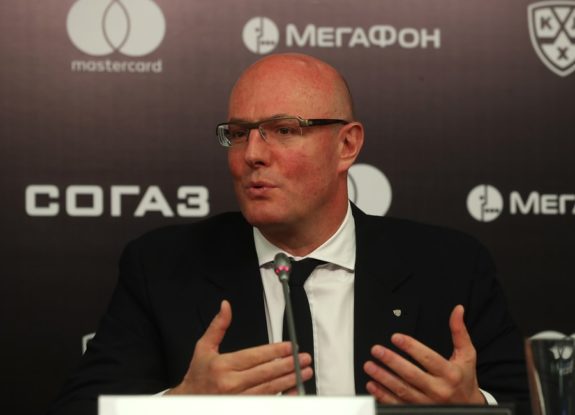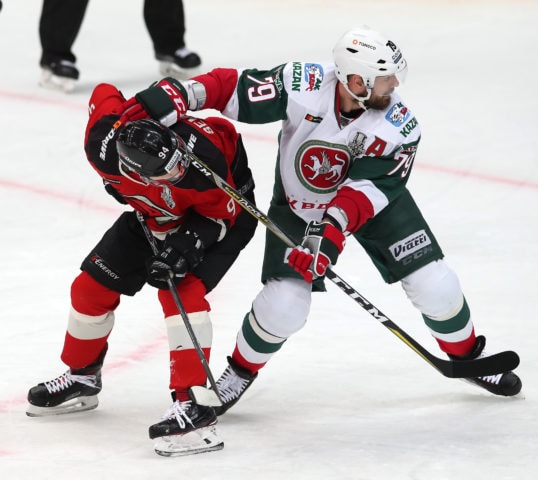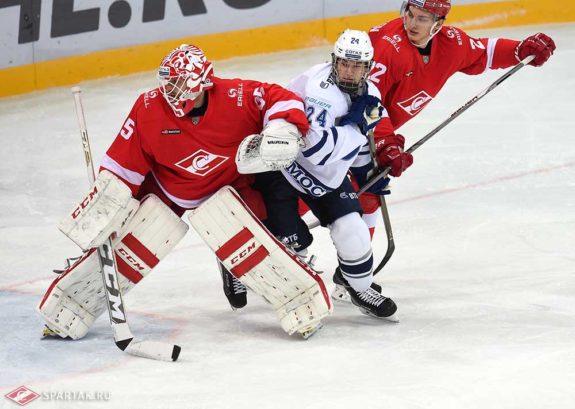The Kontinental Hockey League, also known as the KHL, has obliged its clubs to work within the salary cap of RUR 900 million (USD $13 million) per season. This is too little for the league’s rich clubs and just right for the mid-level clubs. The role of club managers is increasing with new salary caps in place. Wise management and clever negotiating tactics allow clubs with modest budgets to sign strong players and boost their competitiveness on ice.
Related: The Story of My Russian KHL Odyssey
KHL stars are now taking drastic cuts to their contract amounts, just to stay in the game and continue to grow as players. True money might follow, but definitely not this season.
Former KHL president Dmitriy Chernyshenko has lobbied this initiative. He currently serves as vice prime minister in the Russian government.

Many clubs, mostly those based in Moscow and St. Petersburg, would rather have a higher cap, or none at all. However, the league sticks to its policy. One of the reasons the league stays firm about its decision is to ensure a gradual “decrease of financing professional sports at the costs of state corporations or companies with state-owned stakes.”
Rich Clubs Hit Hardest
Such KHL grand clubs as CSKA Moscow, Dynamo Moscow, SKA St. Petersburg and Avangard Omsk are struggling in the aftermath of this decision. According to Kommersant.ru, a dozen CSKA players earned more than a million dollars a year with some going above a million and a half.
Although CSKA’s most expensive players are about to leave for the NHL, the club is still struggling to fit into the new budget. Mikhail Grigorenko, Maksim Shalunov, Ilya Sorokin, and Kirill Kaprizov will most likely show up on the rosters of NHL clubs next season. CSKA badly needs to stop offering lucrative contracts to players of third and fourth lines.
Related: Bandy – The Other Ice Hockey
Avangard has managed to downsize contracts of its key players by about 30 percent. Thus, Aleksey Yemelin has agreed to forget about his contract for $1.3 million and will earn “only” $870,000. Goalie Emil Garipov lost two-thirds of his contract, falling from $1 million to $360,000.

Foreigners enjoy some protection of their contracts in the KHL and can take a tougher line in negotiations. In case the clubs renege on contracts with foreigners unilaterally, a 25 percent compensation payment is due to such players.
Taylor Beck is standing in the midst of a similar situation in Omsk. His $1 million contract is too expensive for the club, according to BIZNESS Online publication from Kazan. Beck’s luck may be on his side, if Metallurg Magnitogorsk decides to take him on board.
Cody Franson left Avangard on May 1. Avangard’s most modest contract is with Semyon Ruchkin, a 23-year-old defenseman, off to his third season in the KHL. Ruchkin will earn $87,000 next season.
Smaller Clubs Grow Competitive
Spartak Moscow and Vityaz Podolsk are the teams with strong management, which is hunting opportunities. Spartak “pursues the current transfer campaign aggressively with the obvious goal of making the red-and-whites grow and developing from the mid-level team into leaders of the Western Conference”, writes Kommersant.ru.

Spartak’s GM Alexei Zhamnov has already lured four strong foreigners into his team: Finnish center Jori Lehterä, Martin Bakoš from Slovakia, Czech Lukas Radil, and Swede Emile Deuce. All of them have played within the system of the NHL clubs.
Related: The Evolution of Europeans in the NHL
Vityaz’s GM Igor Varitskiy has signed five strong players for his team so far. Swede Mattias Tedenby is arriving from Davos in Switzerland. Canadian Justin Danforth will arrive from Finland in the status of the best player in the Finnish league. Nail Yakupov is arriving from SKA St. Petersburg. Moreover, reinforcements are coming from Moscow: Latvian Kaspars Daugavins and Russian Fyodor Malykhin will exchange Spartak’s jerseys for those of Vityaz.
In general, the initiative for capping the salary budgets in the NHL might drive some of the better players to the richer havens on the other side of the Atlantic or the Pacific, taking the vast scopes of Russia into account. But the competitiveness within the league will grow. This shall make games more vivid and popular. The game of hockey shall win.